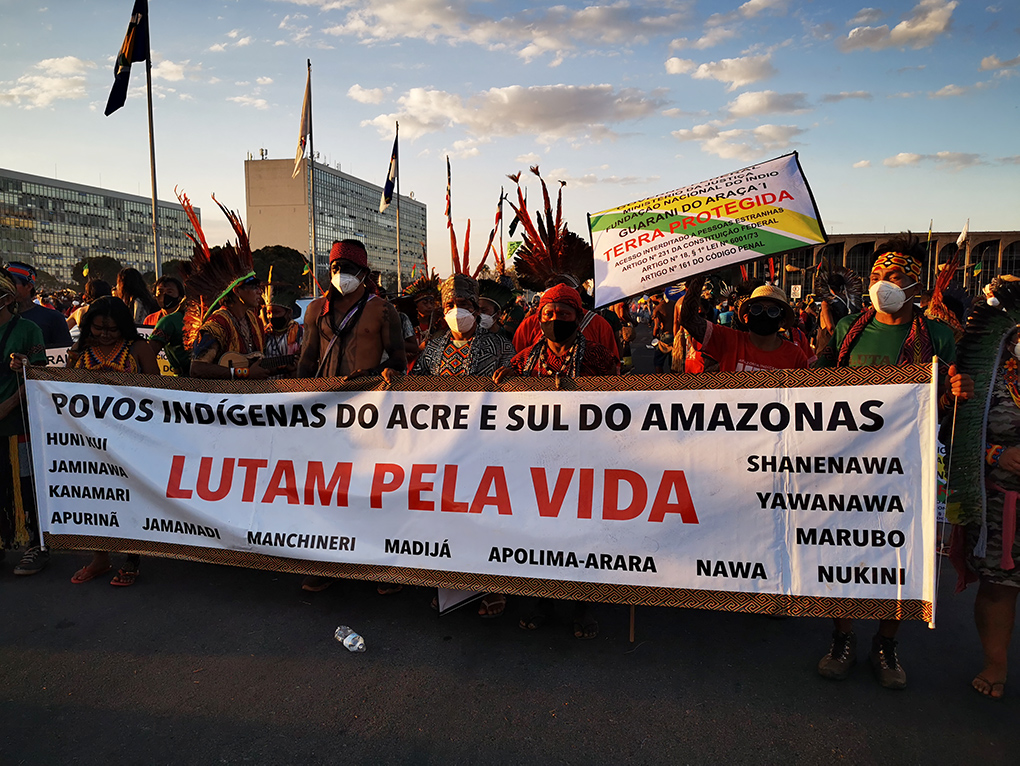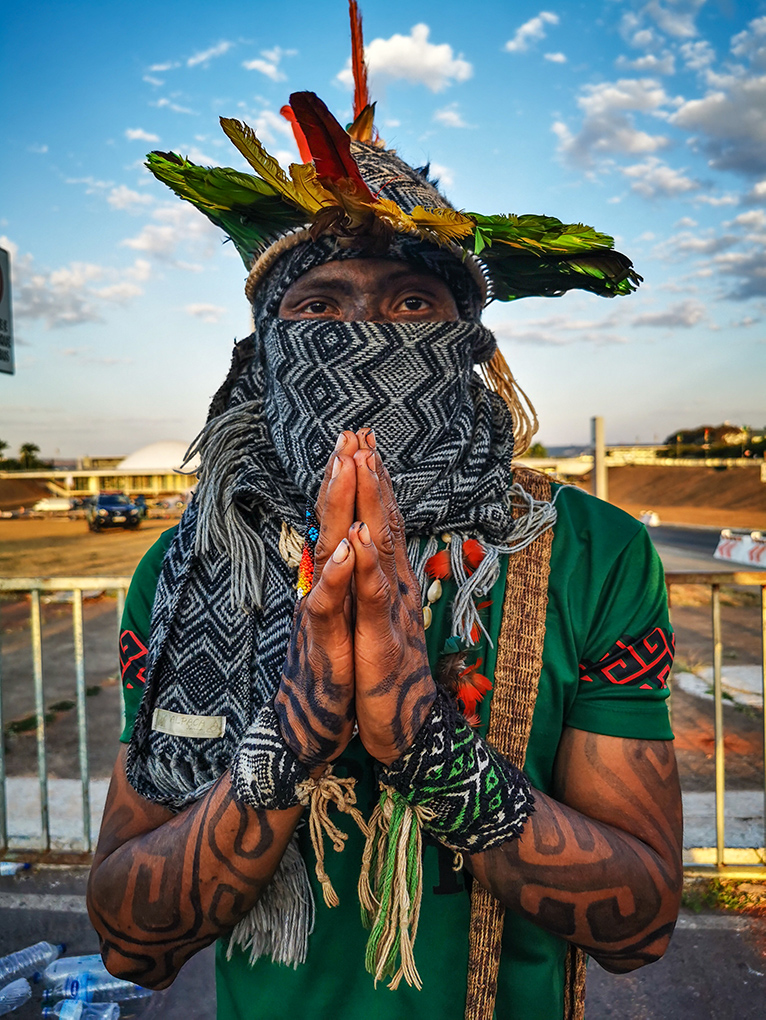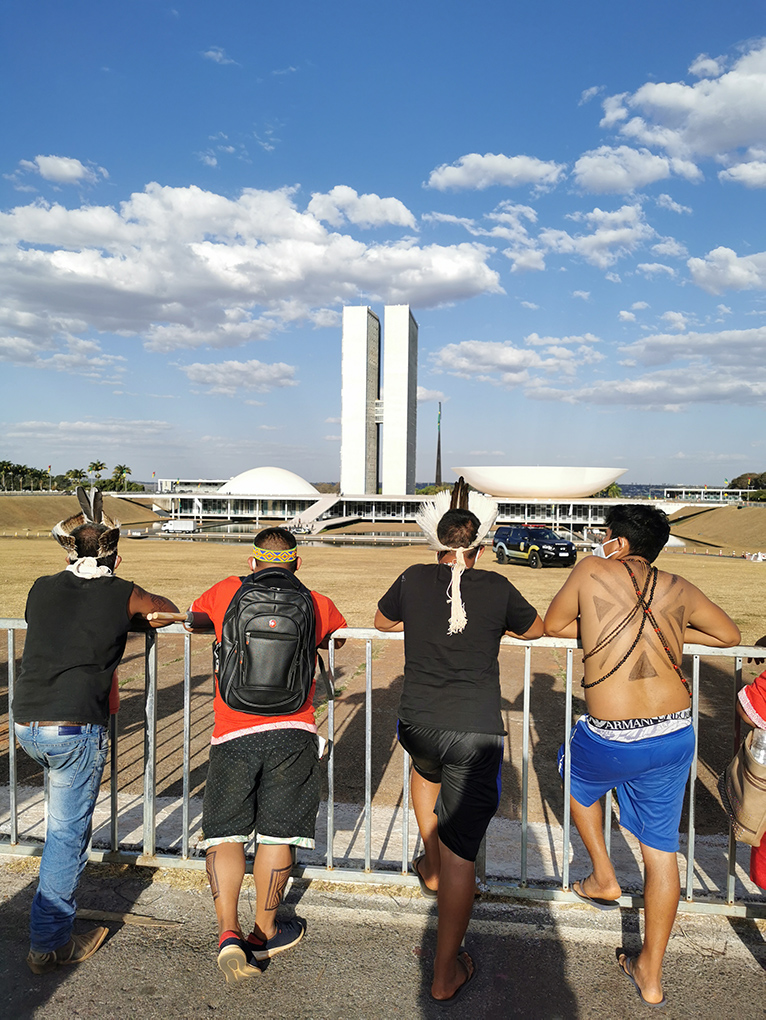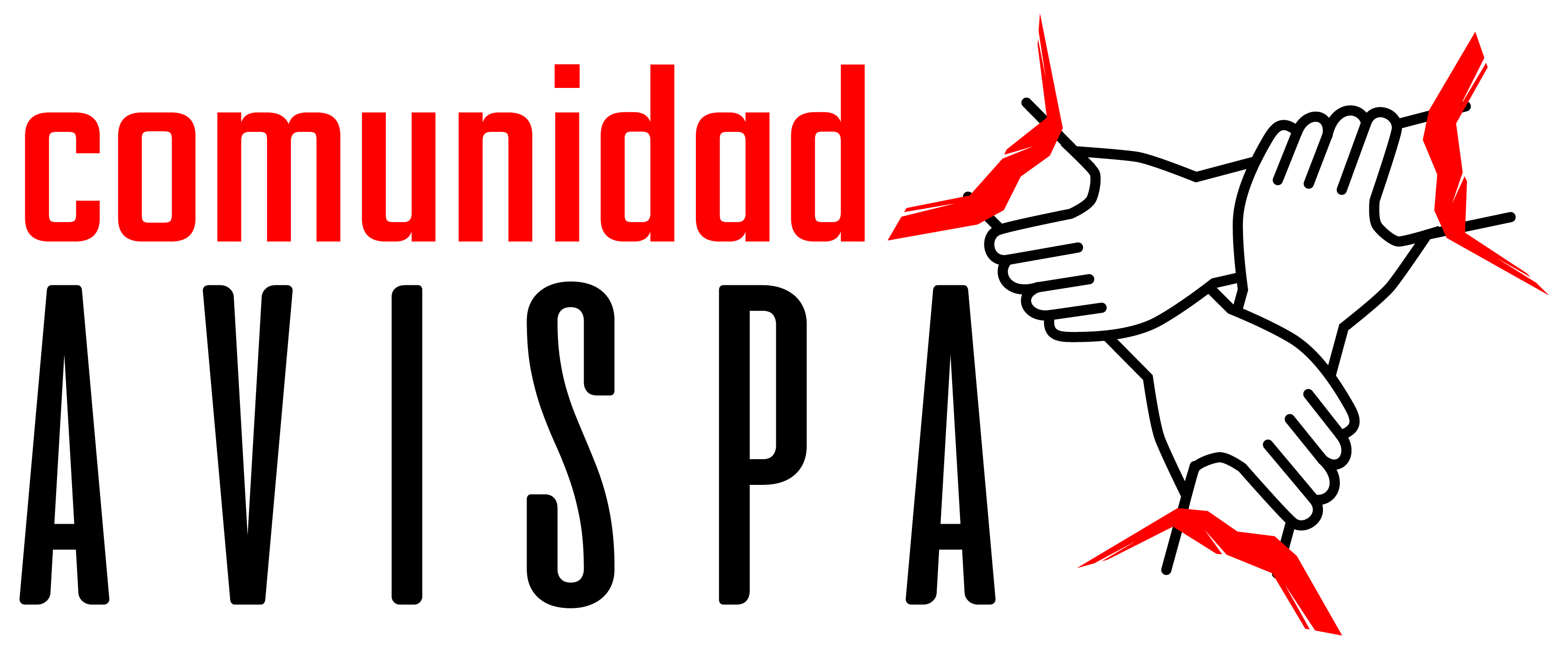Front page photo: Indigenous mobilization in Brasília heads to the esplanade of the ministries to hold a vigil against the reform of the so-called "Time Frame". Photo by Vito Ribeiro
At least 6,000 Indigenous people came together from all over Brazil for a series of protests in Brasilia, the country’s capital. The delegations include representatives from 117 Indigenous peoples, who traveled for days by bus and truck. This is one of the biggest demonstrations that Indigenous peoples have organized in recent times, centered around a legislative reform that would implement what is being called the “time frame” criterion concerning the demarcation of Indigenous territory. The reform would limit what is considered ancestral territory to lands that have been occupied since the 1988 constitution was enacted.
If approved, this initiative would further threaten possession and recognition of these territories and directly affect hundreds of Indigenous land claim cases currently under litigation, above all for peoples who were driven off their lands or dispossessed during the 1964-1985 military dictatorship and up through the passing of the 1988 constitution.
The demonstrators have planned diverse actions that began August 22 and will conclude on August 28. Actions intensified on Wednesday, August 25, lifting people’s spirits. Meanwhile, the Federal Supreme Court (STF) will reach a verdict defining the Brazilian state’s process for recognizing ancestral territories, or, on the contrary, its disregard for this unique right that First Peoples have, known as “demarcation of Indigenous lands.”
Although the legal recourse of “demarcation” considers Indigenous peoples to be mere “land users,” if this law is passed, the villages that were created after 1988 will be considered illegal in their own lands.
Struggle for Life

“We’re conducting the biggest mobilization of our lives in Brasilia, because our future and all of humanity’s are on the line. To speak of demarcation of Indigenous lands in Brazil is to speak of guaranteeing the future of the planet with solutions to the climate crisis,” said Sonia Guajajara, an Indigenous woman and one of the coordinators of the Articulation of Indigenous Peoples of Brazil (APIB).
This campaign is called “Struggle for Life.” Among other points, they state, “we stand for our rights and for promoting action against the anti-Indigenous agenda in motion in the national congress and the federal government,” stated the APIB.
In a unified voice, these peoples have shouted, “Bolsonaro Out!” They have denounced the increase in violence within and outside of their traditional territories since Jair Bolsonaro became president. These complaints have reached agencies outside of Brazil. On August 9, International Indigenous Peoples’ Day, APIB presented an unprecedented declaration before the International Penal Court (CPI) “accusing the Bolsonaro administration of genocide and ecocide,” according to the peoples that make up the organization.
The APIB stated that the Bolsonaro’s policies have been openly “opposed to Indigenous peoples” and that additionally, “since he took office, he has signed several acts that violate the Constitution and international treaties protecting Indigenous communities and their territories.”
Brazil’s capital city was alive with protests, but also songs, speeches, and political discussions. Over the week, the delegations have been presenting an intense program of political debates and cultural events. “We have to give visibility to and raise the voices of the Indigenous movement as a whole. In this scenario with so many threats, communication plays a key role and we will be joining forces in this encampment,” said Erisvan Guajajara, coordinator of Media India.
The APIB is made up of: the Articulation of Indigenous Peoples of the Northeast, Minas Gerais and Espírito Santo (APOINME); the Counsel of the Terena People; the Articulation of Indigenous Peoples of the Southeast (ARPINSUDESTE); the Articulation of Indigenous Peoples of the South (ARPINSUL); the Great Assembly of Guaraní Kaiowá Peoples (Aty Guasu); the Coordination of Indigenous Organizations of the Brazilian Amazon (COIAB); and the Guaraní Yvyrupa Commission.
Who Is Interested in this Reform?
The interest in removing recognition of ancestral Indigenous territory is centered around a congressional segment known as “ruralists or ranchers,” who represent international agribusiness giants such as Bayer, BASF, Bunge, Cargill, Coca Cola, Dow, DuPont, Kraft, Monsanto, Unilever, Danone, Carrefour, ChemChina, Cofco, Glencore, Nestlé, and Syngenta, among others.
Meanwhile, the Trade Balance records of the National Agricultural Commission (CNA) showed that Brazilian exports of agro-industrial products grew by 15.8% in 2021, compared to the same period last year. This institution assures that a “series of meetings are being held with the National Secretariat of Public Security to define an agenda focused on increasing rural security in Brazil”. Among other issues, includes a discipline on public safety of military personnel working in the rural police.
In addition, APIB denounces that Bolsonaro has been pushing a bill to authorize mining and other extractive activities in several ancestral territories, mainly in the Amazon.






